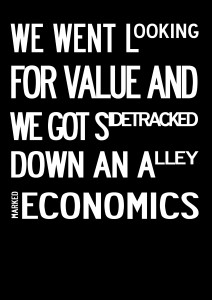A brand is a vehicle for creating and maintaining value.
The product is the product.
The quality of the product is the responsibility of manufacturing or operations
The value of the product is the responsibility of marketing and HR.
The realisation of that value is the responsibility of sales.
Despite its vital role in their continued survival, too many businesses do not understand value.
And they assume value and profit have a linear relationship.
They don’t.
The study of value is called axiology.
Axiology looks at value by studying ethics and aesthetics.
The term was coined by Paul Lapie in 1902, and echoed by Eduard von Hartmann in 1908.
Von Hartmann is important because his thinking – outlined in his wonderfully titled, “The Philosophy of the Unconscious” – has been recognised as a link between Schopenhauer and Freud.
But, way before Lapie and von Hartmann put a label on it, great thinkers recognised value as a product of right and wrong and beauty and harmony.
In 1967, Robert S. Hartman (one ‘n’) attempted to put mathematical rigour around value.
His study, “The Science of Value” was seen as the origin of Value Theory.
Value Theory seeks to understand how and why people value things.
His contention was that value could be broken into systemic value, extrinsic value and intrinsic value.
In an effort to make value measurable, theorists use psychology, sociology and economics to frame value.
In the process, value has got lost in economics. Or, more specifically, finance.
In an effort to find empirical measures, we place greater value on what can be observed by scientific method.
Which are usually things that can be counted.
Like money.
We went looking for proof of value and all we proved was people like money.
The trouble for marketers is our core role is not measuring value.
Our core role is creating value.
We do that best through understanding motivators not by checking indicators.
The underlying fault in relying on data, it seems to me, is this.
If value was empirical, it would be a linear measure.
But value, all value, is human. So there is no constant measure.
Think of it this way.
If three men spend 10 hours making 5 widgets, and we get them to make 6 widgets in 10 hours, over the course of the year we make 20% more for the same outlay.
An empiricist would say we’re more effective.
The reality could simply mean the widget makers get the shits and go somewhere else and our widget-making capability goes from 5 a day to 0.
Value is human.
It’s why we’re prepared to pay $50,000 extra for a car – and justify it by saying it saves us $15 a week in petrol.
Brands need to be built and managed on a basis of human values, not empirical ones.
And the people charged with creating value for organisations – marketing and HR – need to understand this.
Marketing and HR are not siloes.
They’re the same department.


Leave A Comment